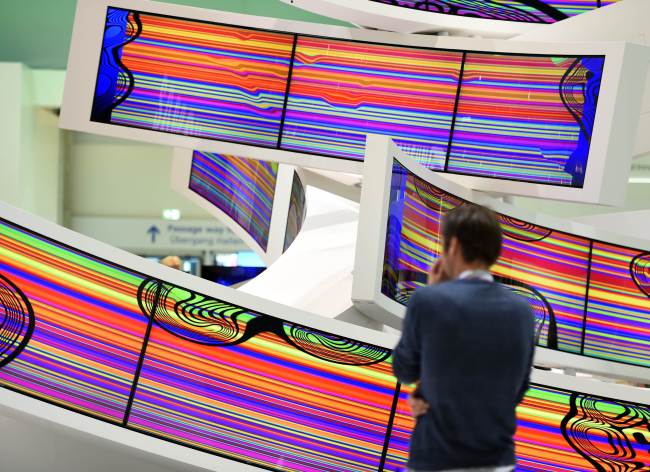BERLIN (AFP) ― It’s long been the stuff of science fiction, but tech giants hope the “smart home,” where gadgets talk to each other and the fridge orders the milk, will soon become reality.
The futuristic vision of wireless domestic bliss that puts people and their smartphones or tablets at the center of an “Internet of Things” is a key theme at this year’s IFA consumer electronics fair in Berlin.
Industry titans such as Google, Samsung and Apple have been battling for an early lead in the race to create the Internet-connected household, a market they expect to grow into the next multi-billion-dollar tech revolution.
The smart home is heading “towards a mass-market reality,” said Lisa Arrowsmith of market research firm IHS.
The new driving force, she said, is “the rise of the smartphone and its role as a common user interface to allow remote and in-home control of devices such as thermostats, smart plugs or security systems.”
The futuristic vision of wireless domestic bliss that puts people and their smartphones or tablets at the center of an “Internet of Things” is a key theme at this year’s IFA consumer electronics fair in Berlin.
Industry titans such as Google, Samsung and Apple have been battling for an early lead in the race to create the Internet-connected household, a market they expect to grow into the next multi-billion-dollar tech revolution.
The smart home is heading “towards a mass-market reality,” said Lisa Arrowsmith of market research firm IHS.
The new driving force, she said, is “the rise of the smartphone and its role as a common user interface to allow remote and in-home control of devices such as thermostats, smart plugs or security systems.”

Talk of creating the “automated home” has been around since at least the 1980s, but was hobbled by technical hurdles, from tangled cables to costly interfaces and compatibility problems between appliance manufacturers.
Now the dream is back with a vengeance as companies foresee a world of synced devices, where motorists remotely switch on the heating as they drive home, and holidaymakers watch over their houses from the beach with security camera footage.
At the IFA in Berlin, South Korea’s Samsung presented its 2020 vision of the “house of the future,” replete with a hologram chef who gives step-by-step cooking instructions, and digital sports coaches that keep an eye on your morning workout.
“For many it’s still just a vision, but change is coming and it’s coming fast,” promised Samsung Electronics CEO Yoon Boo-keun “BK.”
“Just remember how quickly, in just a few years, smartphones and tablets have changed our lives.”
To add innovation muscle to its smart home push, Samsung in August bought the U.S. start-up SmartThings, which is developing apps to link up electric devices and household appliances, for a reported $200 million.
The move came after Google in January paid a jaw-dropping 3.2 billion dollars for Nest Labs, which makes fire alarms and sophisticated thermostats that save energy and can detect whether people are at home or out.
“The Internet of Things is the breakthrough that was needed to make the smart home possible,” said Annette Zimmermann of IT research and advisory company Gartner Research.
Last year some 17 million home automation devices were sold, according to analysts at ABI Research, which predicts their number will top half a billion units by 2018.
Big industry players are now battling to establish the dominant platform for the intelligent home.
Among them is Microsoft, which has already entered living rooms with its Xbox game console that can sense movement and speech via its Kinect system and is designed as a hub for online activity.
Apple recently presented the HomeKit, a platform to connect compatible devices and a space where software developers can create the necessary applications.
“Competition is fierce because the market is wide open,” said Julien De Preaumont, marketing director of Withings, a pioneer in France that makes Internet-connected bathroom scales, home surveillance systems and other devices.
“Consumers are adopting new products, and it is their practices which will determine the future.”
-
Articles by Korea Herald



![[Weekender] Geeks have never been so chic in Korea](http://res.heraldm.com/phpwas/restmb_idxmake.php?idx=644&simg=/content/image/2024/05/16/20240516050845_0.jpg&u=)


![[News Focus] Mystery deepens after hundreds of cat deaths in S. Korea](http://res.heraldm.com/phpwas/restmb_idxmake.php?idx=644&simg=/content/image/2024/05/17/20240517050800_0.jpg&u=)
![[Herald Interview] Byun Yo-han's 'unlikable' character is result of calculated acting](http://res.heraldm.com/phpwas/restmb_idxmake.php?idx=644&simg=/content/image/2024/05/16/20240516050855_0.jpg&u=)











